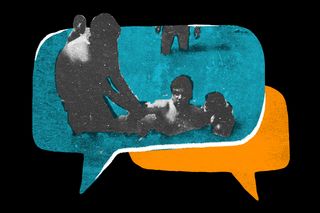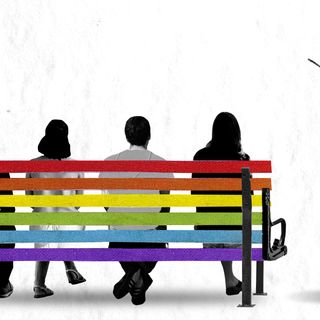
In Conversation: On the Indian Couple Who Was Thrashed for Public Kissing
The team discusses pressing events that say something about our culture, and why it matters. Today, we talk about how PDA kills.

The team discusses pressing events that say something about our culture, and why it matters. Today, we talk about how PDA kills.
A rather disturbing video surfaced a few hours ago, showing a man being violently beaten for kissing a woman – presumably his partner – while bathing in the Ayodhya’s Saryu river. The expression of love, and even desire, was quickly termed as an “act of vulgarity” as people in the vicinity physically tore the man away from his wife.
This case of moral policing is just one of many. Displays of affection, in public and private, visibly rattles a whole nation’s sensibility. The Swaddle’s editorial team dissects this cultural anxiety to understand who gets to express love and how, and the understated implications of suppressing sexuality so violently and without impunity.
*
RN: There are so many questions that come up here: what is it about this place, this gesture, and this time that set off this chain of events? There is something unsavory about the fact, moreover, that there is a video of this circulating without protecting the couple’s privacy. More disturbing is the fact that the video starts with their embrace; before any beating even took place. The video voyeurism already tells a story of a nation’s sexual repression; the violence makes it a snuff film.
If every instance of making out in public ended in violence, nights out at bars, evenings in a park, sunsets at the beach, all would have been rendered empty and devoid of their mythic passion. The unspoken social code that this couple in particular violated, then, was that it was at the wrong time – broad daylight – and in the wrong place – a place of prayer.
The first thing that struck me was the abject humiliation that the mob intended to subject the couple to. One onlooker was heard saying “such vulgarity will not be tolerated in Ayodhya.” Why? Is it because it is supposedly the birthplace of a mythological man who willingly, knowingly, and publicly made his wife walk through fire? Is this the kind of public display of affection that is accepted at Ayodhya? That a gesture of sensuality even between a heterosexual couple is so intolerable to onlookers is a symptom of moral rot in the onlookers, not in the couple. That they felt the need to violently stamp out expressions of desire speaks to how threatening that desire is. It violates sanctimonious “middle class” mores and how – it breaks the notion that desire isn’t respectable, and is something to be ashamed of.
Related on The Swaddle:
Allahabad HC Orders Reinstatement of Person Fired for Displaying Affection with Queer Partner
To me, this couple was brave. Their love/lust is an act of protest for the fact that it was expressed in a river considered holy, in a city considered divine – it turns the purity myth on its head and asks why we as a culture want to purge sex from worship.
What will happen to the couple now? Will they ever be able to resume the passion so brutally interrupted? It is distressing to think of the social cost – presumably, their families will now be aware of it, and maybe the couple will be socially ostracized. If the shame wins, it spells doom not only for this one couple, but for all of us as a nation. In the political project to sanitize, everything akin to life and love is at risk.
DR: For starters, there’s absolutely nothing wrong with two adults consensually kissing each other. Why society thinks their approval matters in a scenario like this is beyond me. I believe the fact that individuals who form a part of the society, have been conditioned to perceive anything remotely sexual as “immoral” and “shameful,” has led to this state of affairs. Normalizing sexual repression, perhaps, causes them to lash out at people who refuse to subscribe to that norm — since it challenges their worldview and threatens to upend the status quo. What they forget, though, is that the norm they’re trying to uphold is a harmful one. It can lead to difficulties in enjoying — or, even engaging — in sex, besides creating feelings of guilt about experiencing sexual desires, and, of course, discomfort with nudity and even the topic of sex itself.
Naturally, then, we as a society are so ashamed of the subject that we can’t even educate our children about it. Leave alone sex education, biology teachers also rush through chapters on the reproductive system — evidently, we’ve reached a point where we find scientific deliberations on the human anatomy itself obscene. So, is it surprising, then, that children grow up learning about sex through porn, and then grow up with a toxic — and, at times, even criminal — outlook towards sex? In a society where a harmless expression of desire and affection is met with violence, there’s no alternative for them, is there?
Related on The Swaddle:
Respectfully Disagree: What’s Wrong With PDA?
It’s high time we grew out of the alleged Victorian construction that stripped sex of sensuality, love, and affection — treating it simply as a means to procreate and further one’s progeny. This is believed to have resulted in emotionally distant and formal relations between couples — far from the image of the happy, loving family we have been taught to aspire for through movies like Hum Saath Saath Hain and Kabhi Khushi Kabhie Gham.
SK: Something stopped me from thinking of this as an instance of public display affection gone wrong. The anxieties around PDA are well documented and apply best to unmarried partners in relationships outside the heteronormative binary. But people, falling within the conventional mold of a family, could inspire an ire so violent then betrays the deeply embedded unease around sex and desire in the first place. Are these the same anxieties that dictate how we think of PDA? Pretty much, but there is something amiss here.
We very flippantly dismiss PDA as being too excessive and unnecessary, forever associating it with “cringe” that makes us uncomfortable more than anything. A couple kissing at the dinner table? Oh, dear. A couple kissing in public? Quick, look away. But what prevents us from looking away, and instead in the very direction of this couple, is just how political PDA can be. The implication of the PDA plays out differently depending on geographies. In a culture where moral indignity is rarely ever restricted and spills over into actual violence, the freedom of exhibiting affection to an “acceptable” partner is lost too. An ironic fact comes to mind: there is some anthropological evidence to suggest the “french kiss” originated in India instead, as Atish Patel of The Wall Street Journal pointed out. Maybe some kiss in public out of love, others out of defiance. But only some possess the ability to express it and engage with it, making PDA a cultural commodity that is passed in upper-caste, upper-class circles and remains the currency for heterosexual love mostly.
There are social and physical costs of showing affection — and in so many cases they turn fatal. We’re tempted to dismiss those instances as collateral damage in the larger fight against sexual purity. But the couple in Ayodhya represents the story of individual damage in the quest of a cultural war. Forever lies this document in the form of a video that will circulate as WhatsApp forwards, retweets, and Facebook posts where people mock and ridicule them. They are the unwitting mascots of an ideological tussle, but they may not have the resources or the inclination to partake in it.
The question is not only one of how we define and measure PDA, but what happens once we do. It is a luxury only some can afford. For others, I can’t help but wonder, is the cost of life and dignity worth it? In our fight to reclaim and take ownership of sexual desire, who are we forgetting – and worse, sacrificing?
Related


How Asexual People Feel Excluded From Queer Spaces, Complicating Their Identity
